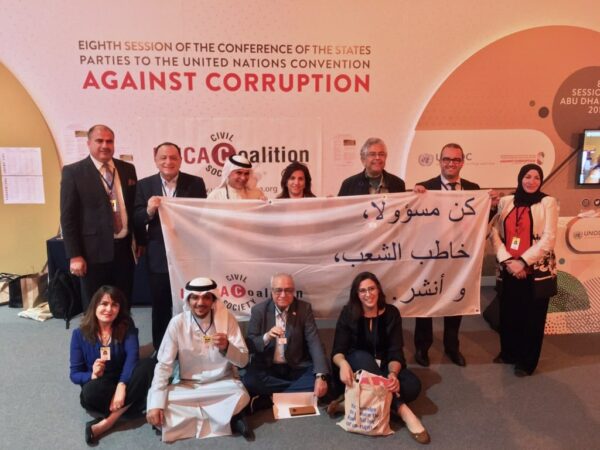14 April 2023 –
How can the right to information (RTI) be used in a limiting environment? In which specific areas has RTI proven to be effective in advancing transparency and accountability in MENA? And how could CSOs promote the release of information while maintaining a constructive approach towards the government? These pivotal questions were discussed during the 1st regional meeting for 2023 of the UNCAC Coalition’s MENA regional group, addressing the challenging RTI context in which the members of the group operate; The MENA region being at the bottom of the ranking of countries and regions that protect the right to information and enshrine the principles of transparency in its conduct of public affairs and public funds. The experiences presented were diverse and unique, considering the national realities and the challenges accompanying them.
The Coalition’s plans for 2023
The meeting was opened by Yonatan Yakir, Programme Manager & UN Affairs Lead, and Aya Riahi, the Coalition’s MENA board member, welcoming the MENA members and encouraging them to actively participate in the different Coalition-led activities. Yonatan updated the members on preparations for the 10th UNCAC Conference of the States Parties and presented the activities planned for this year. He highlighted that CoSP 10 would mark the 20th anniversary of the signing of the UNCAC, which provides an opportunity to raise public awareness and take stock of the progress made in the past two decades. He mentioned that the Coalition has significantly grown in terms of membership and staff and now has five operational thematic working groups. The Coalition continues to develop its UNCAC implementation monitoring tools, including its ATI campaign and has started to train CSOs on how to apply them as part of their advocacy efforts. The Coalition has also begun organising focused regional training sessions, in collaboration with CSOs in its network, such as on open contracting and open data to prevent public procurement corruption.
Practical use of the right to information
The thematic discussion focused on three experiences of the use of the right to information, aiming to prove the usefulness of RTI in MENA countries. The presenters highlighted the challenges that come with the use of RTI and the importance of raising public awareness and promoting advocacy work to popularize and develop its use in the region.

Mr Sharafeddine YaKoubi, President of Onshor Association from Tunisia, presented the experience of his association in using RTI to publish value-added information in different fields, such as public infrastructure, municipalities management, and Government accountability. He also presented activities implemented with the Tunisian administration to raise their capabilities in meeting proactive disclosure of information and open data standards, which served as a good example of ways CSOs could support national stakeholders in their capacity-building efforts.
Ms Hilda Shafiq, Executive Director of the Jordan Transparency Center, presented her organization’s experience mainly in advocacy work in Jordan for the popularization and development of the use of RTI.
Ms Hajar Trabelsi, President of the Tunisian Association for Governance and Social Accountability, presented on the Tunisian experience in using RTI, especially in the campaigns conducted right after the outburst of the Arab Spring and the election of the constituent assembly. These campaigns aimed mainly to enhance the transparency of the assembly, in particular around the work of the various committees responsible for preparing the new Tunisian constitution. She also highlighted the use of RTI by Tunisian citizens and described her role as a member of the board of the Commission for Access to Information in the country. In this context, Ms Trabelsi mentioned that the RTI is mainly used to defend other fundamental rights.
To conclude, the presented case studies and the experiences shared by the meeting participants demonstrated the usefulness of the right to access information, as well as the challenges and factors that hinder its use in different MENA countries. The UNCAC Coalition will continue to advocate for broader use of ATI as an essential tool to prevent and combat corruption as part of its strategic priorities for the upcoming years.



